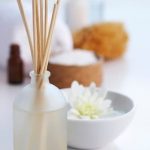Aromatherapy oils have been used for centuries for their therapeutic benefits, offering a natural way to promote overall well-being. In this article, we will explore the origins and history of aromatherapy, as well as the science behind how these oils work. From stress relief to skin and hair care, understanding which essential oils are good for what can be incredibly beneficial in enhancing various aspects of health.
Essential oils are derived from plants through a process of distillation or cold-press extraction. These potent oils contain the aromatic compounds and healing properties of their source plants. Understanding how to use them effectively, whether through diffusion, direct application, or topical use, is key in maximizing their benefits.
As we delve into the different uses of aromatherapy oils in the sections that follow, you will discover a wealth of information on specific oils that are renowned for their stress-relieving, sleep-inducing, pain-alleviating, and energy-boosting properties. Whether you are new to aromatherapy or a seasoned enthusiast seeking to expand your knowledge on essential oils, this comprehensive guide will provide valuable insights on harnessing the power of aromatherapy for your well-being.
Understanding Essential Oils and How They Are Made
Essential oils have been used for centuries for their therapeutic properties, and they are derived from various plant sources such as flowers, leaves, roots, and bark. The extraction process of essential oils involves methods such as distillation, cold pressing, or solvent extraction. Each method results in a highly concentrated oil that captures the fragrance and healing properties of the plant it is derived from.
Different methods of using essential oils include diffusion, direct application, inhalation, and topical application. Diffusion is a popular way to enjoy the benefits of essential oils by using devices such as diffusers or aromatherapy lamps to disperse the oil molecules into the air. Direct application involves diluting the essential oil with a carrier oil and applying it to the skin for absorption.
Inhalation is another effective method where the aroma of the oil is inhaled directly from the bottle or through steam inhalation. Lastly, topical application involves massage or applying a diluted mixture of essential oils to specific areas of the body.
It’s important to note that while essential oils offer numerous benefits, they are highly concentrated substances and should be used with caution. Always follow proper dilution guidelines and safety recommendations when using essential oils to avoid adverse reactions.
The Best Aromatherapy Oils for Stress Relief
Stress and anxiety are common issues that many people face, and aromatherapy can be a natural and effective way to alleviate these feelings. There are several essential oils known for their calming and stress-relieving properties. One of the most popular oils for stress relief is lavender. Studies have shown that the scent of lavender can help reduce stress and anxiety levels. Another excellent oil for stress relief is chamomile, which is well-known for its soothing and relaxing properties.
In addition to lavender and chamomile, bergamot oil is also highly effective in reducing stress and tension. This citrus-scented oil has been used in aromatherapy to elevate mood and alleviate stress. When using aromatherapy oils for stress relief, it’s important to dilute them properly with a carrier oil before applying them to the skin or using them in a diffuser.
Aromatherapy oils can be used in various ways to reduce stress, including through inhalation, topical application, and even by adding a few drops to bathwater. By incorporating these oils into your daily routine, you can experience their calming effects and significantly reduce feelings of stress and anxiety.
| Aromatherapy Oil | Main Benefits |
|---|---|
| Lavender | Reduces stress and anxiety levels |
| Chamomile | Soothing and relaxing properties |
| Bergamot | Elevates mood and alleviates stress |
Aromatherapy Oils for Sleep and Relaxation
Many essential oils are known for their ability to promote relaxation and improve sleep quality. Lavender oil is one of the most popular choices for this purpose, as it has been extensively studied for its calming effects. Its soothing aroma can help reduce anxiety and stress, making it ideal for use before bedtime.
Another excellent option is chamomile oil, which is well-known for its gentle sedative properties. This oil not only aids in relaxation but also helps with insomnia and restlessness.
In addition to lavender and chamomile, bergamot essential oil is also effective in promoting relaxation. It has a citrusy scent that can uplift the mood and alleviate symptoms of anxiety. Meanwhile, sandalwood oil is commonly used for its grounding and calming properties. Its earthy fragrance helps create a peaceful atmosphere conducive to relaxation and unwinding after a long day.
When using these aromatherapy oils for sleep and relaxation, it’s essential to dilute them properly before applying them to the skin or using them in a diffuser. By doing so, you can fully enjoy their benefits without any risk of skin irritation or adverse reactions.
| Aromatherapy Oil | Benefit |
|---|---|
| Lavender Oil | Calming effects, reduces anxiety and stress |
| Chamomile Oil | Sedative properties, aids in relaxation and insomnia |
| Bergamot Essential Oil | Citrusy scent uplifts mood, alleviates anxiety symptoms |
| Sandalwood Oil | Grounding and calming properties conducive to unwinding |
Essential Oils for Headache and Migraine Relief
For centuries, essential oils have been used to alleviate headaches and migraines due to their natural healing properties. Certain aromatherapy oils are known for their analgesic and anti-inflammatory properties, making them effective in managing headache symptoms. These oils can be utilized through various methods such as inhalation, topical application, or even by adding a few drops to a warm bath for overall relaxation.
When it comes to headache relief, some of the best aromatherapy oils to consider include:
- Peppermint Oil: Known for its cooling sensation and ability to relax muscles. Peppermint oil is often used to relieve tension headaches.
- Lavender Oil: Renowned for its calming effects on both the mind and body. Its anti-inflammatory properties make it beneficial for easing migraine pain.
- Eucalyptus Oil: Contains analgesic compounds that help in relieving sinus headaches and promoting better airflow, which can aid in reducing the intensity of migraines.
It’s important to note that while essential oils can provide relief for some individuals, they may not work for everyone. It’s always advisable to perform a patch test before using any new oil and consult with a healthcare professional if you suffer from chronic headaches or migraines. Additionally, it’s crucial to use high-quality, pure essential oils for optimal results.
Aromatherapy Oils for Energy and Focus
In today’s fast-paced and demanding world, many individuals find themselves struggling to maintain energy levels and stay focused throughout the day. Aromatherapy oils can be beneficial in helping to boost energy and enhance mental focus naturally. Some essential oils are known for their invigorating properties, which can be used to combat fatigue and increase alertness.
One of the most popular essential oils for energy and focus is peppermint oil. The invigorating scent of peppermint has been shown to help increase alertness and cognitive performance. This refreshing oil can be diffused in your workspace or diluted with a carrier oil and applied to pulse points for a quick pick-me-up during the day.
Another effective essential oil for improving mental clarity and concentration is rosemary oil. It has been traditionally used to enhance memory and cognitive function. Diffusing rosemary oil while studying or working on a mentally challenging task can help promote mental alertness and improve productivity.
For individuals seeking an energy boost without the jitters associated with caffeine, citrus oils like lemon and orange are excellent choices. These oils have uplifting fragrances that can help combat feelings of lethargy and promote a positive mood. Diffusing citrus oils or using them in a personal inhaler can provide a natural way to increase energy levels throughout the day.
Incorporating aromatherapy oils into your daily routine can be a simple yet effective way to support your energy levels and mental focus. Whether you choose to diffuse these oils, apply them topically, or use them in a personal inhaler, experimenting with different essential oils can help you find the perfect combination that works best for you.
Aromatherapy Oils for Pain Management
Aromatherapy oils can be effective in managing various types of pain, including muscle aches, joint pain, and headaches. These essential oils have natural analgesic and anti-inflammatory properties that can help provide relief from discomfort. When used correctly, aromatherapy oils can be a safe and holistic alternative for pain management.
Exploring Essential Oils for Pain Relief
Some of the best essential oils for pain management include lavender, peppermint, eucalyptus, and rosemary. Lavender oil is known for its calming and pain-relieving properties, making it useful for tension headaches and general muscle aches. Peppermint oil has a cooling effect that can soothe sore muscles and alleviate headache symptoms. Eucalyptus oil is commonly used to relieve joint pain and inflammation, while rosemary oil is beneficial for reducing muscle stiffness and improving circulation.
Methods of Using Aromatherapy Oils for Pain
There are several ways to use aromatherapy oils for pain relief. Diluting the essential oil in a carrier oil and applying it topically to the affected area can provide localized relief. Aromatherapy massage using these oils can also help relax muscles and alleviate discomfort. Inhaling the aroma of these oils through diffusion or steam inhalation can contribute to overall relaxation and pain reduction.
Tips for Using Aromatherapy Oils Safely
When using aromatherapy oils for pain management, it’s important to dilute them properly to avoid skin irritation or allergic reactions. It’s also crucial to choose high-quality, pure essential oils to ensure their effectiveness. Consulting with a qualified aromatherapist or healthcare professional can provide personalized guidance on using aromatherapy oils safely and effectively for pain relief.
Essential Oils for Skin and Hair Care
When it comes to skincare and haircare, essential oils can be a game-changer. These natural oils are known for their various benefits, including moisturizing, soothing, and promoting overall health. Whether you’re dealing with dry skin, acne, or hair concerns, there’s an essential oil that can help address your specific needs.
Benefits of Essential Oils for Skin
Essential oils offer a wide range of benefits for the skin. For example, lavender essential oil is known for its calming and soothing properties, making it ideal for sensitive or inflamed skin. Tea tree oil is famous for its antibacterial and anti-inflammatory properties, which can help treat acne and blemishes. Meanwhile, rosehip seed oil is prized for its ability to hydrate the skin and reduce the appearance of scars and fine lines.
Benefits of Essential Oils for Hair
Just as essential oils can benefit the skin, they can also work wonders for the hair. For instance, peppermint essential oil has a cooling effect on the scalp and can help stimulate hair growth. Rosemary oil is another popular choice for promoting hair thickness and strength. Additionally, chamomile essential oil is known for its soothing properties, making it an excellent option for calming an irritated scalp.
Using Essential Oils Safely
While essential oils offer numerous benefits for skincare and haircare, it’s crucial to use them safely. Essential oils are highly concentrated substances and should never be applied directly to the skin without dilution. It’s important to do a patch test before using any new essential oil to ensure you don’t have an allergic reaction. Additionally, pregnant women or individuals with certain medical conditions should consult a healthcare professional before using essential oils topically or internally.
Incorporating essential oils into your skincare and haircare routine can provide natural solutions to common concerns while indulging in luxurious aromas that promote relaxation and well-being.
Combining Aromatherapy Oils for Personalized Blends
Creating personalized aromatherapy blends can be a fun and rewarding process that allows individuals to tailor the benefits of essential oils to their specific needs. When combining different aromatherapy oils, it is important to consider both the therapeutic properties of each oil and how they interact with one another. To create a well-balanced blend, it’s essential to understand the unique characteristics of each oil and how they can complement or enhance one another when combined.
When creating personalized blends, it’s helpful to start with a clear intention or desired outcome in mind. Whether it’s relaxation, pain relief, or improved focus, having a specific goal for the blend can guide the selection of essential oils and their proportions in the final mixture. For example, those seeking a calming blend may want to incorporate lavender, chamomile, and bergamot essential oils, while individuals looking for an energizing blend may opt for peppermint, rosemary, and citrus oils.
In addition to understanding the properties of individual oils, it’s crucial to consider how different scents harmonize with one another. A well-balanced blend should not only offer therapeutic benefits but also be pleasurable to smell. Experimenting with small test batches and taking note of how different combinations make you feel can help in developing a signature aromatherapy blend that resonates with your personal preferences and needs.
Conclusion
In conclusion, the use of aromatherapy oils has been proven to have a wide range of benefits for overall well-being. From stress relief and better sleep to pain management and improved focus, essential oils offer a natural and holistic approach to enhancing both physical and mental health.
Their effectiveness lies in their natural properties and the centuries-old practice that has shown their positive effects on individuals. By harnessing the power of aromatherapy oils, individuals can potentially find relief from various ailments and improve their quality of life.
It is important for individuals to understand the specific benefits of different essential oils and how they can be effectively used to address their personal needs. Whether it’s creating custom blends for specific concerns or using individual oils for targeted results, there are numerous ways to incorporate aromatherapy into one’s daily routine. With the right knowledge and guidance, individuals can experience the transformative effects of aromatherapy oils on their physical, emotional, and mental well-being.
As this article comes to an end, it is encouraged for readers to explore the world of aromatherapy oils and discover how they can integrate these natural remedies into their lives. Whether it’s through diffusing calming oils at home, applying soothing oils for relaxation, or using invigorating oils for energy, there are endless possibilities for incorporating aromatherapy into daily routines.
By doing so, individuals may find themselves experiencing a greater sense of balance, tranquility, and vitality in their lives. Harnessing the power of aromatherapy oils is not just about finding relief from specific issues but also about embracing a more holistic approach to wellness.
Frequently Asked Questions
Which Essential Oils Are Used for What?
Essential oils are used for a variety of purposes, including relaxation, stress relief, pain management, skin care, and even insect repellent. For example, lavender essential oil is often used for its calming effects and to promote better sleep, while peppermint essential oil is popular for its ability to alleviate headaches and improve mental clarity.
What Are the 10 Best Essential Oils to Try for Aromatherapy?
The 10 best essential oils to try for aromatherapy include lavender, peppermint, eucalyptus, tea tree, lemon, chamomile, rosemary, sandalwood, frankincense, and ylang-ylang. Each of these essential oils offers unique benefits for physical and emotional well-being when diffused or used topically.
What Are the 12 Must Have Essential Oils?
The 12 must-have essential oils cover a range of therapeutic properties and can be useful in various situations. These essential oils include lavender, tea tree, peppermint, eucalyptus, lemon, frankincense, rosemary, chamomile (both Roman and German), ylang-ylang, geranium, and cedarwood.
With this selection of essential oils on hand, one can address a wide array of health and wellness needs effectively.

Are you looking for a natural way to improve your health and wellbeing?
If so, aromatherapy may be the answer for you.





